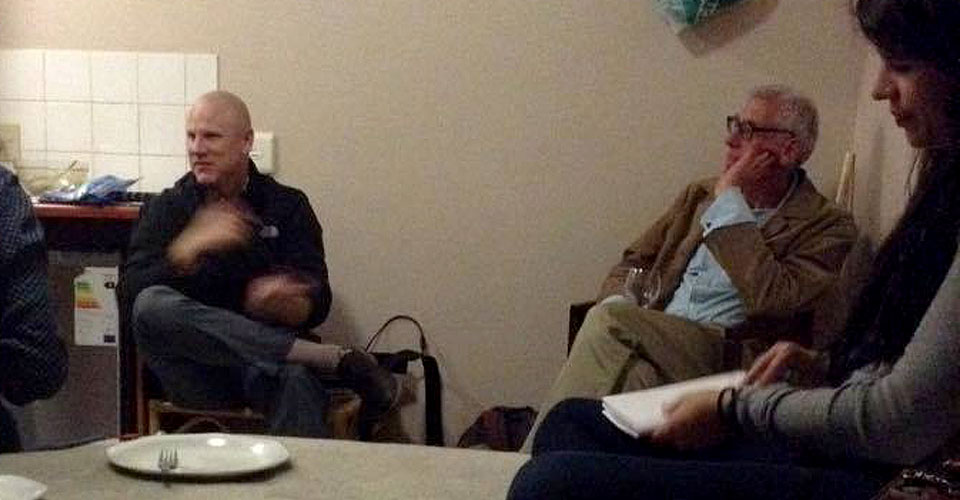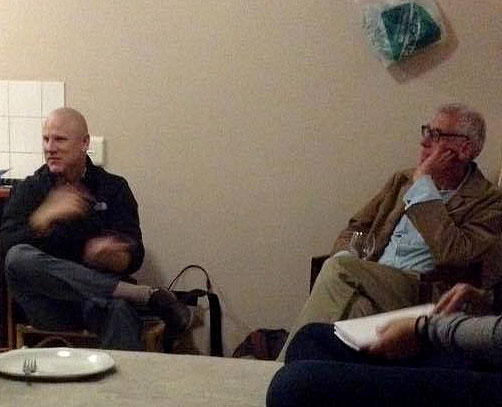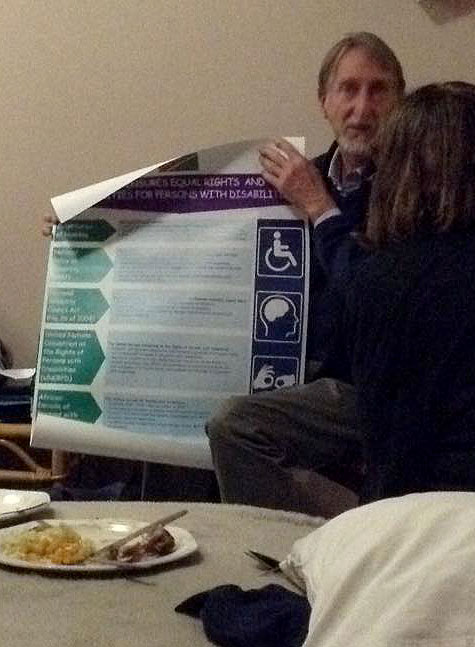
 On June 8-9 the team and I had a wonderful opportunity to share dinner with a few Peace Corps volunteers. These relaxed informative sessions opened our eyes to cultural aspects and information about Namibia we had not yet learned and gave us students a confidant to ask any questions to. The volunteers barely had time to eat as we continuously asked questions, but all three guests were true experts in traveling, living in Namibia, and sharing their life experiences and wisdom with us.
On June 8-9 the team and I had a wonderful opportunity to share dinner with a few Peace Corps volunteers. These relaxed informative sessions opened our eyes to cultural aspects and information about Namibia we had not yet learned and gave us students a confidant to ask any questions to. The volunteers barely had time to eat as we continuously asked questions, but all three guests were true experts in traveling, living in Namibia, and sharing their life experiences and wisdom with us.
Patrick and Lawrence were the first two volunteers we met. Both men are from the United States and live in Namibia. Patrick has been here for more than three months and has a two-year assignment where Lawrence is a response volunteer which usually lasts three, six or nine months, but Lawrence is a rare case and is working here for 12 months. Additionally, Lawrence has worked on every continent and wanted to take on this final continent, although he has two children and a wife in Germany. According to Lawrence, he is one of 20 people in the world doing work like his efforts which nearly makes him Peace Corps royalty. Lawrence is working with individuals to create business plans and find connections for people wanting to start up these businesses. As a business expert, he is able to look at some plans in a matter of minutes and dissect each aspect and give guidance where improvements must be made. Patrick has been living in Africa for a few years and works in an office setting. After Patrick and Lawrence gave us their background information, we began the true discussion, which was about the culture.
 According to the volunteers, there is no common language in Namibia as there are many tribes in Namibia and students are supposed to be taught Afrikaans along with English. The goal is to move toward becoming an English-speaking country, but there are not enough teachers well versed in English to educate others about the language and continue the cycle. Another astonishing fact Lawrence stated was that there are 20 radiologists in all of Namibia, and 15 are situated in the capital city of Windhoek. Most health care professionals go to school in South Africa as universities in Namibia are not accredited and the personnel do not come to Namibia often, hence a shortage of professionals. This country has been independent for 25 years and elected a new president this past year, which means more changes are coming to Namibia.
According to the volunteers, there is no common language in Namibia as there are many tribes in Namibia and students are supposed to be taught Afrikaans along with English. The goal is to move toward becoming an English-speaking country, but there are not enough teachers well versed in English to educate others about the language and continue the cycle. Another astonishing fact Lawrence stated was that there are 20 radiologists in all of Namibia, and 15 are situated in the capital city of Windhoek. Most health care professionals go to school in South Africa as universities in Namibia are not accredited and the personnel do not come to Namibia often, hence a shortage of professionals. This country has been independent for 25 years and elected a new president this past year, which means more changes are coming to Namibia.
One aspect about the discussion I found to be the most interesting was that Patrick and Lawrence stated there are always games to be played, as if a favor is done an act is always expected in return. According to the two, “this game is not one that cannot be understood by an equation.” Having connections and keeping on good terms with them is a way of live, and although this mindset is prominent in Namibia connections are valid in the United States as well.
 Pronounced gender roles truly exist, but these roles exist in every country. My favorite line of the night was, “This continent (Africa) is one of stories and experiences,” and I can truly attest to that from all of the people I have interacted with over the past few weeks and the stories I will carry with me forever. After the volunteers left I reflected on my experiences in Namibia so far and am still trying to formulate my own beliefs and opinions about the developing nation I am currently in.
Pronounced gender roles truly exist, but these roles exist in every country. My favorite line of the night was, “This continent (Africa) is one of stories and experiences,” and I can truly attest to that from all of the people I have interacted with over the past few weeks and the stories I will carry with me forever. After the volunteers left I reflected on my experiences in Namibia so far and am still trying to formulate my own beliefs and opinions about the developing nation I am currently in.
The next night David joined our dinner discussion and gave an entirely new perspective. David has been living in Namibia for eight years and works in the Ministry of Health and Social Services. One of his focuses is to find people with disabilities as they are sometimes hiding in rural areas, getting people informed of resources, programs and services available to them, and helping people with disabilities function at their highest possible level in a society that is not always inclusive to people with disabilities. One of the hardest parts of this talk to grasp for me was that in American children are given services and resources in schools, but here students are using broken magnified glasses to help them read. Although this idea saddens me, at the same time I am excited to see what this developing nation is able to do to accommodate all people with visual impairments or any disability. Currently there are human rights action plans, parents pooling together to start building a voice and associations to educate people with disabilities and get them connected to as many resources as possible. Currently in Namibia, education about disabilities and resources is not known to many, and David believes it may take decades until changes come into play.
At this time many people in Namibia are unaware of the positive impacts people with disabilities may have on society and David believes the attitudes of many must be changed before major advancements in society may occur. Improving the quality of live for people with disabilities is also in the workings, but this is sometimes difficult in a country filled with so many languages, a high unemployment rate, inaccessible buildings, etc. Repeatedly David mentioned, “We are part of the change,” and I look forward to learning of the progressions Namibia makes towards incorporating people with disabilities into society.
After learning about the Peace Corps from three seasoned travelers I gained excitement to another possibility my career as a teacher may take me, but for now I am thrilled to continue visiting NISE to teach the wonderful learners I have been working with for the past few weeks! The Peace Corps is a fantastic organization and if you would like more information on how to become a volunteer, please visit the their website!
Dankie,
Katie Morici
Katie Morici, an elementary education and special education major, is blogging about her study abroad experience in Namibia, Africa.
